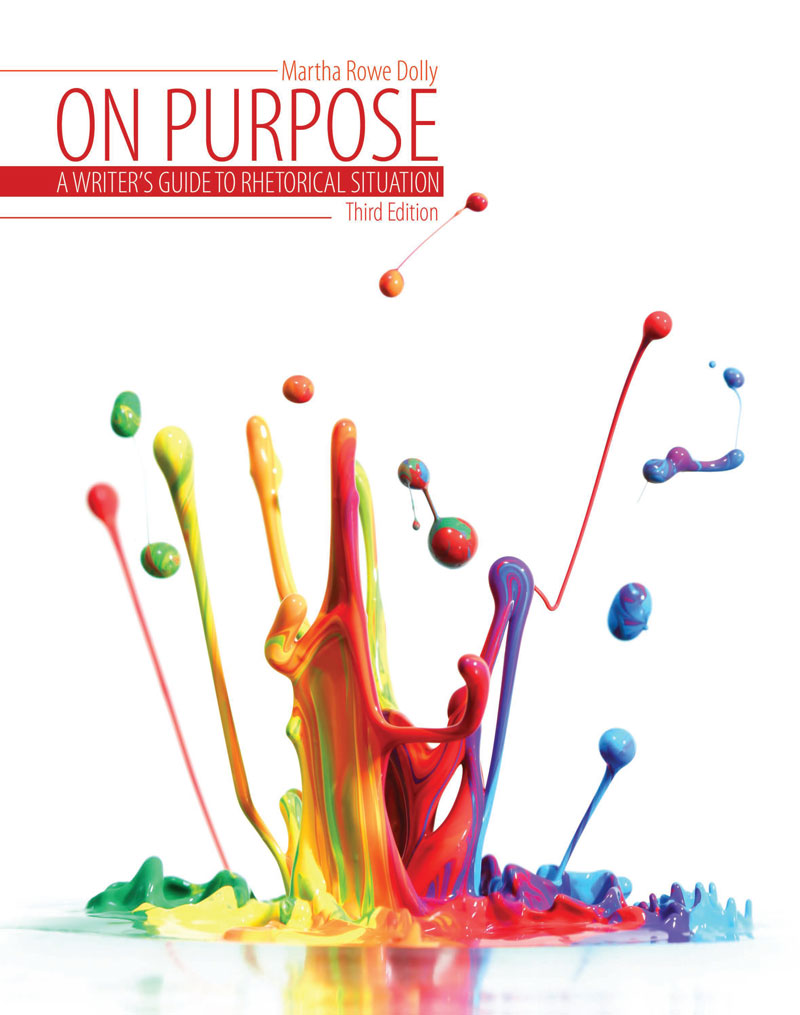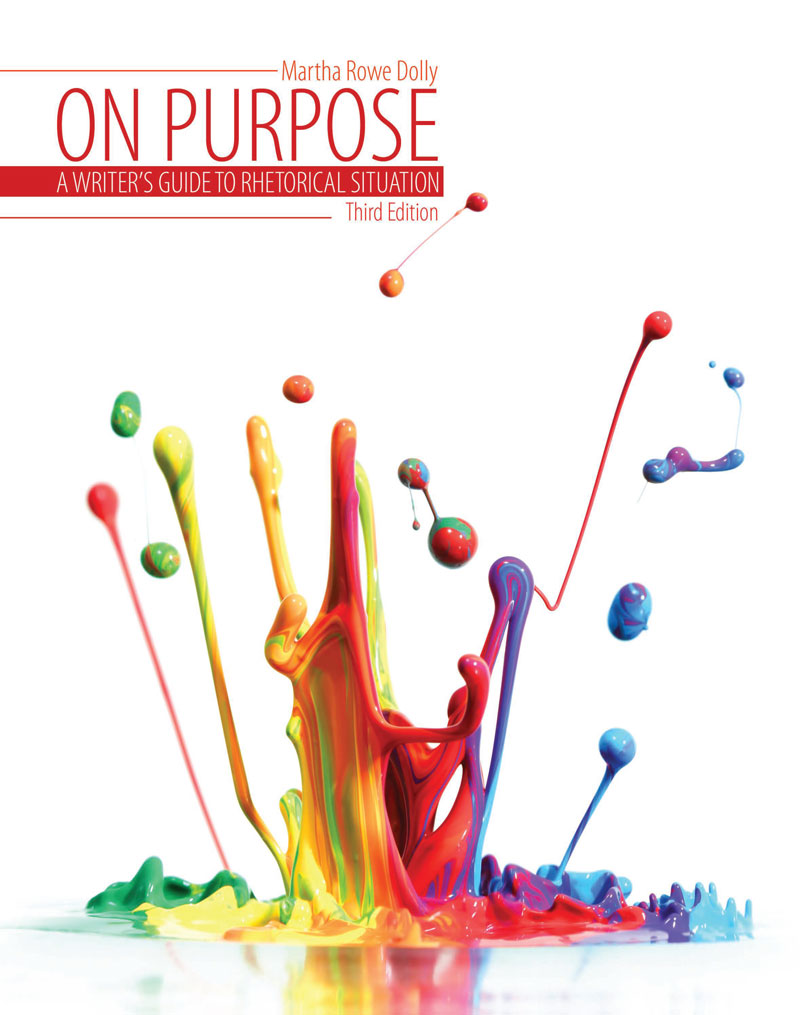On Purpose: A Writer's Guide to Rhetorical Situation
Author(s): Martha R Dolly
Edition: 3
Copyright: 2016
Pages: 122
On Purpose focuses on audience, purpose, genre, and other elements of rhetorical situation. Its goal is to prepare social science majors for future research-based academic and professional writing, including non-academic genres. The author, Martha Rowe Dolly, has taught social science advanced composition and English linguistics for more than 25 years; two student consultants, Karissa (social work) and Valerie (nursing), contribute their own insights and experience.
On Purpose first explores rhetorical situation; it then looks at key social science genres (research report and literature review) from a rhetorical angle and at “re-purposing” research writing for new situations. The dozens of realistic examples are based on genuine writing concerns of majors in psychology, social work, education, nursing, and other social sciences. The book includes a section addressing concerns of writers whose first language is not English as well as appendices to guide all writers in their decisions about rhetorical situation for a variety of genres.
Each section presents a question that a student has asked, might have asked, or should have asked. Among these questions are “How can anyone write two or three documents on the same topic?” and “How can I determine how long a document should be?” Every section includes one or two “sticky situations” that pose a rhetorical challenge, asking readers to analyze the issue and formulate suggestions. On Purpose addresses common misconceptions, emphasizing that writers cannot rely on instructors, supervisors, or citation programs and templates to determine all matters of length, style, formatting, and documentation. By considering rhetorical strengths and weaknesses of fellow undergraduates, social science writers can analyze their own writing situations more productively.
Part I
Purpose: The Core of Rhetorical Situation
Background
1. Graduation is coming up, so do I really need to work more on writing?
2. What exactly does “rhetorical situation” mean?
3. Purpose and audience I think I get, but what exactly are genre and vehicle?
4. Audience Schmaudience! Would I ever really write for anyone but a teacher?
5. How can I gain more experience and confidence in real-world writing?
6. Can I ever write for more than one audience or purpose?
7. Is a lot of planning always necessary? I prefer to jump in and then revise.
8. Why does writing seem so much more complicated than speaking?
9. Could multilingual writers face any special rhetorical challenges?
Part II
Research Writing: A Door to Applying Rhetorical Situation
Background
10. So do all these rhetorical factors relate somehow to doing research?
11. Can using formatting templates and citation machines make research writing easier?
12. Could teachers be more specific about what they want?
13. Is it always necessary to sound stuffy and formal in research writing?
14. Is a research thesis the same as an essay thesis?
15. Do I need to learn more about using sources? I thought we did all that in freshman comp!
16. How can a mere student write a long enough and good enough document for experts?
Part III
Re-Purposing: The “More” of Rhetorical Situation
Background
17. How can anyone write two or three documents on the same topic?
18. So is it all right to write for all interested audiences?
19. When writing for a new audience, how can I get the old one out of my mind?
20. Could good grammar and style differ in a less formal situation?
21. Would at least documentation be the same in all situations?
22. Then does organization depend on rhetorical situation too?
23. How can I appeal to readers who might disagree or be uninterested?
24. How can I be sure I “come across” the way I want to?
25. So can I finally include my own opinion, experience, or creativity in my writing?
How about images?
26. And can I finally use “you”? How about “I” or “We”?
27. When should I state my audience, purpose, and thesis in the introduction?
28. How can I determine how long a document should be?
Part IV
Appendices: A “Store” of Guidelines for Analyzing Rhetorical Matters
Background
Appendix A: Rhetorical Planning – Guidelines for Analyzing (Almost Any) Rhetorical Situation
Appendix B: Rhetorical Guidelines for Common College and Professional Social Science Genres
Appendix C: Before and After Rhetorical Makeover Surveys
On Purpose focuses on audience, purpose, genre, and other elements of rhetorical situation. Its goal is to prepare social science majors for future research-based academic and professional writing, including non-academic genres. The author, Martha Rowe Dolly, has taught social science advanced composition and English linguistics for more than 25 years; two student consultants, Karissa (social work) and Valerie (nursing), contribute their own insights and experience.
On Purpose first explores rhetorical situation; it then looks at key social science genres (research report and literature review) from a rhetorical angle and at “re-purposing” research writing for new situations. The dozens of realistic examples are based on genuine writing concerns of majors in psychology, social work, education, nursing, and other social sciences. The book includes a section addressing concerns of writers whose first language is not English as well as appendices to guide all writers in their decisions about rhetorical situation for a variety of genres.
Each section presents a question that a student has asked, might have asked, or should have asked. Among these questions are “How can anyone write two or three documents on the same topic?” and “How can I determine how long a document should be?” Every section includes one or two “sticky situations” that pose a rhetorical challenge, asking readers to analyze the issue and formulate suggestions. On Purpose addresses common misconceptions, emphasizing that writers cannot rely on instructors, supervisors, or citation programs and templates to determine all matters of length, style, formatting, and documentation. By considering rhetorical strengths and weaknesses of fellow undergraduates, social science writers can analyze their own writing situations more productively.
Part I
Purpose: The Core of Rhetorical Situation
Background
1. Graduation is coming up, so do I really need to work more on writing?
2. What exactly does “rhetorical situation” mean?
3. Purpose and audience I think I get, but what exactly are genre and vehicle?
4. Audience Schmaudience! Would I ever really write for anyone but a teacher?
5. How can I gain more experience and confidence in real-world writing?
6. Can I ever write for more than one audience or purpose?
7. Is a lot of planning always necessary? I prefer to jump in and then revise.
8. Why does writing seem so much more complicated than speaking?
9. Could multilingual writers face any special rhetorical challenges?
Part II
Research Writing: A Door to Applying Rhetorical Situation
Background
10. So do all these rhetorical factors relate somehow to doing research?
11. Can using formatting templates and citation machines make research writing easier?
12. Could teachers be more specific about what they want?
13. Is it always necessary to sound stuffy and formal in research writing?
14. Is a research thesis the same as an essay thesis?
15. Do I need to learn more about using sources? I thought we did all that in freshman comp!
16. How can a mere student write a long enough and good enough document for experts?
Part III
Re-Purposing: The “More” of Rhetorical Situation
Background
17. How can anyone write two or three documents on the same topic?
18. So is it all right to write for all interested audiences?
19. When writing for a new audience, how can I get the old one out of my mind?
20. Could good grammar and style differ in a less formal situation?
21. Would at least documentation be the same in all situations?
22. Then does organization depend on rhetorical situation too?
23. How can I appeal to readers who might disagree or be uninterested?
24. How can I be sure I “come across” the way I want to?
25. So can I finally include my own opinion, experience, or creativity in my writing?
How about images?
26. And can I finally use “you”? How about “I” or “We”?
27. When should I state my audience, purpose, and thesis in the introduction?
28. How can I determine how long a document should be?
Part IV
Appendices: A “Store” of Guidelines for Analyzing Rhetorical Matters
Background
Appendix A: Rhetorical Planning – Guidelines for Analyzing (Almost Any) Rhetorical Situation
Appendix B: Rhetorical Guidelines for Common College and Professional Social Science Genres
Appendix C: Before and After Rhetorical Makeover Surveys

